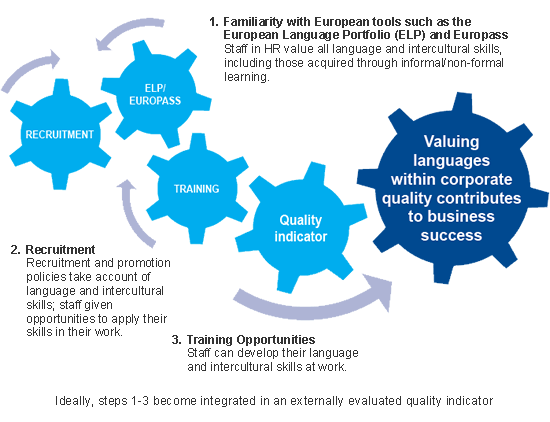Company Survey
30 companies in 8 different countries
(Armenia, Belgium, Canada, England,
Germany, France, Ireland, Italy, Luxemburg
and Russia) and across a wide range of
sectors (agro-industry, energy, manufacturing,
construction, communication, consultancy,
legal and financial services, pharmaceuticals,
retail, tourism and trade) were surveyed
to find out more about how they valued
languages in terms of their recruitment and
training and development policies. Despite
the differences in size, sector and country, the
vast majority of companies recognized the
importance of languages and the increasing
need for languages other than English.
Languages are fundamental for competitiveness.
The importance of informal
and non-formal learning
Many people develop their language and
intercultural skills through informal and
non-formal learning. Key European tools
such as the European Language Portfolio
and Europass can be used to record such
learning. Greater awareness of these tools is
needed both for employees and employers.
Excellent skills in English are becoming more and more important, but at the same time they are less and less sufficient.
The added-value of
plurilingual workspaces
Research shows that companies who
recognise, value and use the language and
intercultural skills of their employees develop
a more satisfied and committed workforce.
This in turn leads to improved internal and
external communication, the discovery of new
market opportunities, a higher public profile
and increased competitiveness.
Our staff needs to speak the language of the customer.
How to create plurilingual workspaces
The diagram below outlines ways in which
companies can make languages and
intercultural communication a central element
of corporate quality and business success.

Companies should be encouraged to use forms of alternative assessment of language competence,
by including recognition of skills gained through informal or non-formal learning in their assessment
of language competences.
Ana Maria Vladau - Brasov School Inspectorate, Romania